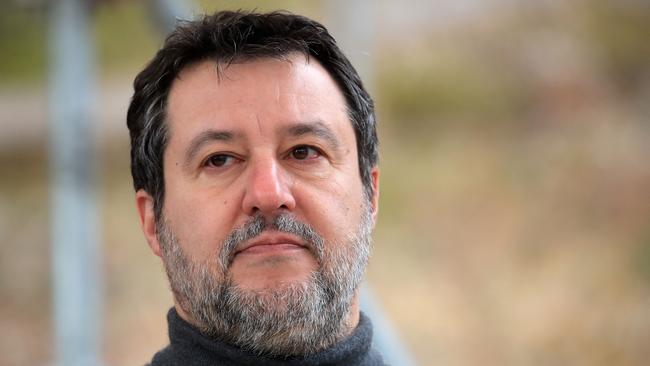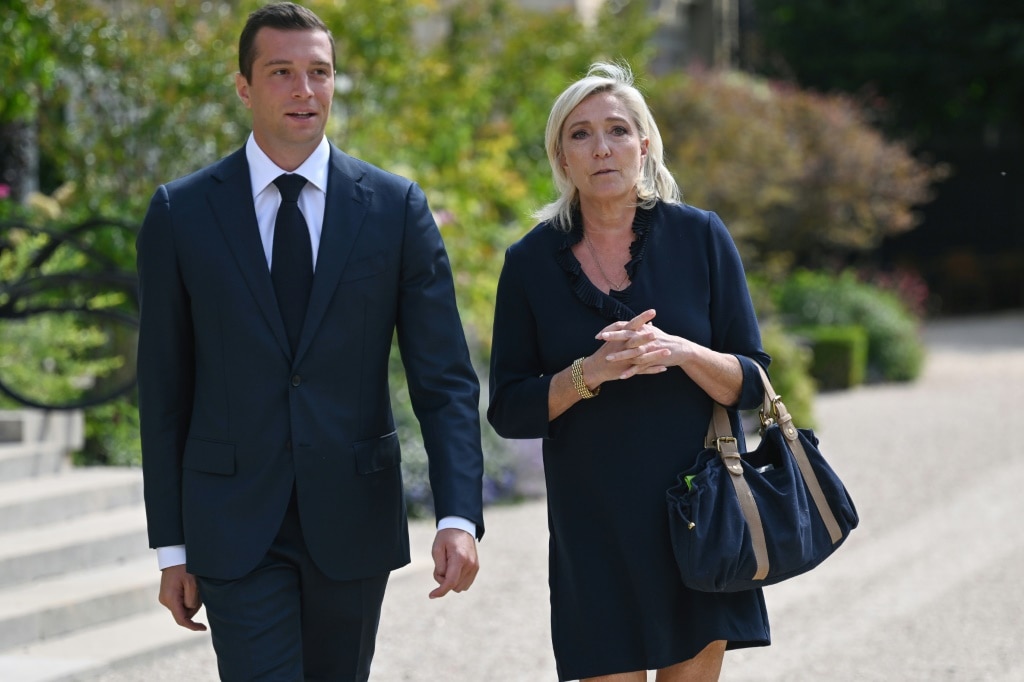Le Pen verdict fuels claims that Europe’s elites are colluding against populists
The Le Pen decision will strengthen a growing narrative among members of the Trump administration, as well as their right-wing nationalist allies in Europe, that liberal elites around the world are undermining democracy by weaponizing the judiciary against political rivals.

Leaders of the US and Europe are increasingly at odds over a key aspect of democracy: How far should the courts go in constraining the power of elected politicians and should those decisions be allowed to undermine the will of voters?
That conflict is sure to deepen after Monday’s decision by a French court found nationalist Marine Le Pen guilty of embezzlement and barred her from politics for five years, making it unlikely she can take part in 2027 presidential elections, when she was expected to be the front-runner, unless she can win a swift appeal.
The decision will strengthen a growing narrative among members of the Trump administration, as well as their right-wing nationalist allies in Europe, that liberal elites around the world are undermining democracy by weaponizing the judiciary against political rivals they don’t want to take power—in much the same way President Trump has claimed he faced legal prosecution before winning his second term.
“When the radical left can’t win via democratic vote, they abuse the legal system to jail their opponents,” wrote Elon Musk on X in response to the French decision. “This is their standard playbook throughout the world.”
In response to the ruling, US State Department spokeswoman Tammy Bruce said it was “concerning” to exclude people from the political process and pointed to the “aggressive and corrupt lawfare waged against President Trump.”
The ruling plays directly into the growing trans-Atlantic debate over democracy, rule of law and political legitimacy, according to Camille Lons, at the European Council on Foreign Relations think tank. Trump has said that a leader who acts in the interest of his country can’t be seen as breaking the law. He and his allies have publicly railed against judges who rule against him or his administration and suggested they should be impeached and replaced.

“In the US, where JD Vance and Donald Trump have repeatedly denounced ‘democracy by judges,’ this verdict is likely to be framed as further evidence of European overreach and democratic decay,” Lons said. American conservatives, she added, will “likely seize on Le Pen’s conviction to argue that centrist elites in Europe are using legal mechanisms to suppress right-wing opposition.”
The move to bar Le Pen, of the National Rally party, comes only months after Romania’s courts overturned the first-round results of a presidential election on the grounds that the winner, right-wing nationalist Călin Georgescu, benefited from Russian influence on his TikTok campaign. Election authorities later barred Georgescu from taking part in May’s do-over elections. Georgescu has denied links to the Kremlin and called the move a political witch-hunt.
Vice President JD Vance, who has sharply criticized the Romania decision, has become the Trump administration’s leading antagonist against Europe. He has chastised European governments for moves he said have weakened democratic values on the continent by shutting out voices they don’t like—either restricting free speech or, in the case of Germany, having a so-called firewall that means mainstream parties don’t cooperate on legislation with the far-right AfD, now the country’s second-biggest party.
“Democracy rests on the sacred principle that the voice of the people matters. There is no room for firewalls,” he said in a speech in Munich in February.
Many mainstream European politicians said it was important to uphold the rule of law in the case of Le Pen. And broadly speaking, much of the voting public agrees. A poll of 3,025 French people by think tank Destin Commun in January found that 59 per cent of respondents agreed that the prosecution of Le Pen, including the possibility of a ban, aimed to “protect democracy.”
The fact that powerful politicians can face defeat in courts could be seen as welcome evidence that no one here is above the law, said Stefan Marschall, professor of political science at Heinrich-Heine University in Düsseldorf, Germany.
“The rule of law can be an economic argument, even a comparative advantage, for Europe,” he said, giving investors assurances that their rights will be respected and their contracts honored even if they displease the powerful.

But many right-wing European nationalists saw politics at play. “People who are afraid of the judgment of the voters are often reassured by the judgment of the courts,” said Italy’s deputy prime minister, Matteo Salvini.
The debate over the best form of democracy is as old as democracy itself. The American Founding Fathers wanted a system of checks and balances, partly to protect minorities from the “tyranny of the majority.” Ensuring the rule of law also helped protect individual rights like property rights.
Most European voters accept that politicians will have limits put on them through the courts, especially in places such as Germany, Spain and Italy that had dictatorships in their recent past. Freedom of speech, while recognized across most of Europe, is also conditional in France, Germany and other European countries that ban hate speech and even limit the use of symbols such as the swastika.
The current US-Europe debate echoes similar controversies that have broken out within Europe in recent years. European anti-establishment populists who won power in Poland and Hungary almost immediately sought to assert themselves over their respective judiciaries, earning strident criticism from their neighbors.
The case of Le Pen still raises thorny questions for democracies: Should the rule of law apply always, or only most of the time? And when it comes to politicians, how can we trust the law is being applied without political considerations?
For many, the debate boils down to whether one trusts the democratic institutions such as courts and regulators taking those decisions. In many cases, they are trustworthy; in other cases, they might be less reliable, especially in younger democracies. Populists on both the left and right often try to discredit institutions or laws they see as interfering with “the will of the people,” whereas most mainstream politicians view institutions as imperfect, but the least bad option in preventing a party or politician from abusing their power.
The disqualification of Le Pen risks deepening the polarization of France’s electorate, divided between urbanites who are broadly supportive of institutions such as the judiciary and rural, working-class voters who see Le Pen as a change agent.
Those voters mistrust institutions. That narrative gathered steam after last summer’s snap parliamentary elections, when disparate parties—ranging from President Emmanuel Macron’s pro-business ranks to the far-left France Unbowed—cooperated to keep Le Pen’s candidates from winning seats by withdrawing underperforming candidates from individual races so that voters could coalesce behind a single candidate opposed to Le Pen.

The case against Le Pen comes after years of deliberations and is a solid case taken by a fiercely independent French judiciary, said Mujtaba Rahman at consultancy Eurasia. But he said the case was likely to raise eyebrows partly because it came so soon after the Romania decision, where the case against Georgescu was widely seen as much more flimsy—based largely on an intelligence report.
“The case against Le Pen was much more clear-cut than Romania,” he said. The French courts were clearly upholding the rule of law, he said. But in the case of Romania, there were legitimate questions over whether there was political interference, he said.
Rahman said he thinks France’s Constitutional Court will take up Le Pen’s case, and is likely to weigh the damage done by not enforcing the letter of the law in this particular case to the damage done to French democracy and voters by preventing a front-runner from taking part.
The case against Le Pen was the best known of a series of investigations into European Parliament lawmakers over the past decade involving allegations they used office payments to fund domestic political work. EU lawmakers receive over 100,000 euros in annual salary but they also receive thousands of euros monthly for staff, travel and other office costs.
Many of the cases have targeted lawmakers from populist, right-wing parties. The UK Independence Party, the precursor of Britain’s Reform Party, was fined several hundred thousand euros after a probe into its use of funds, with its leader Nigel Farage having his salary halved to recoup money. Like the National Rally, UKIP said the case was politically motivated and denied wrongdoing.
Some EU lawmakers from mainstream parties have at times been targeted. France’s current prime minister, Francois Bayrou, was eventually acquitted by a French court last year after facing a yearslong probe into whether his party had misused European Parliament funds.
European Parliamentary sources say what was different about the National Rally case was the systematic and protracted use of EU funds for domestic political work among a number of lawmakers, amounting to millions of euros.
Wall Street Journal







To join the conversation, please log in. Don't have an account? Register
Join the conversation, you are commenting as Logout